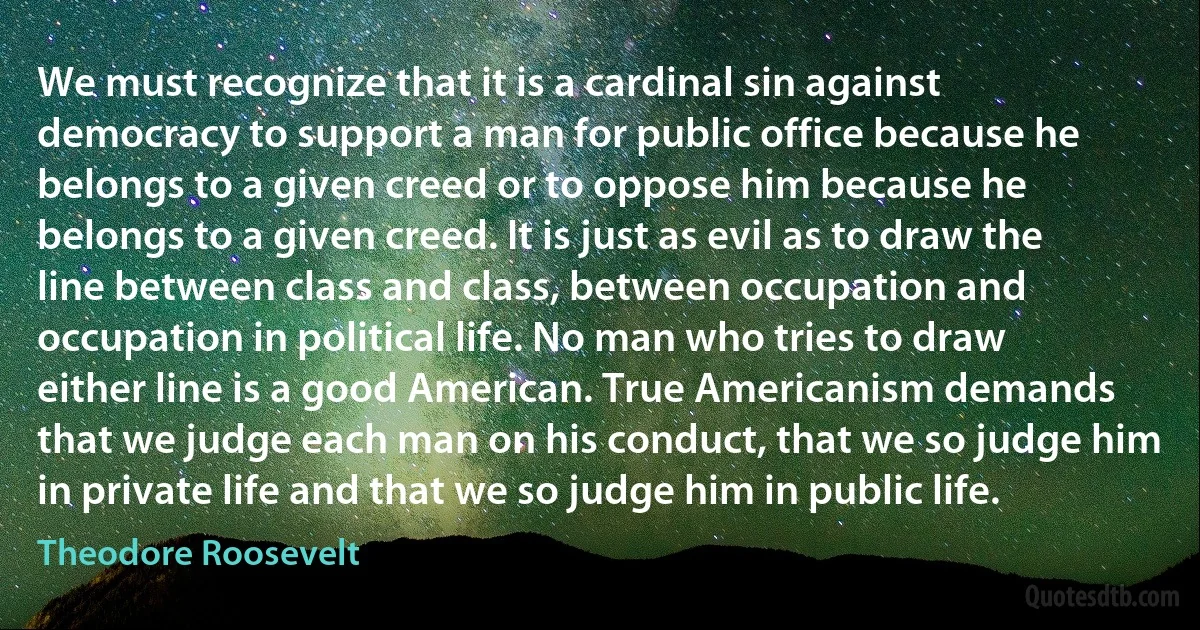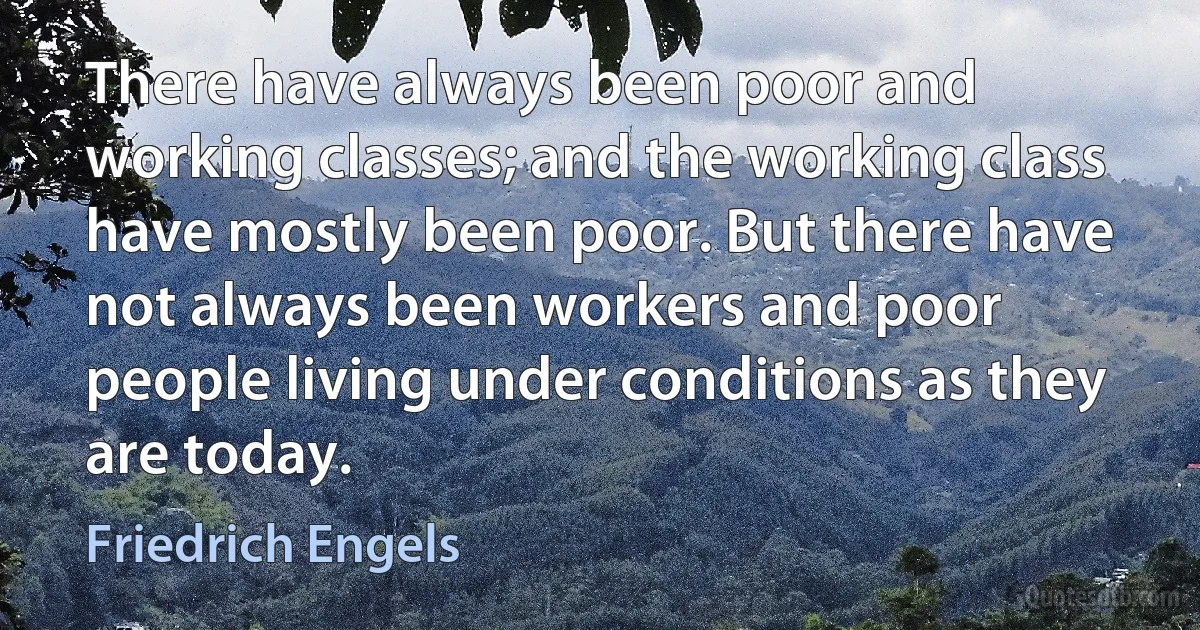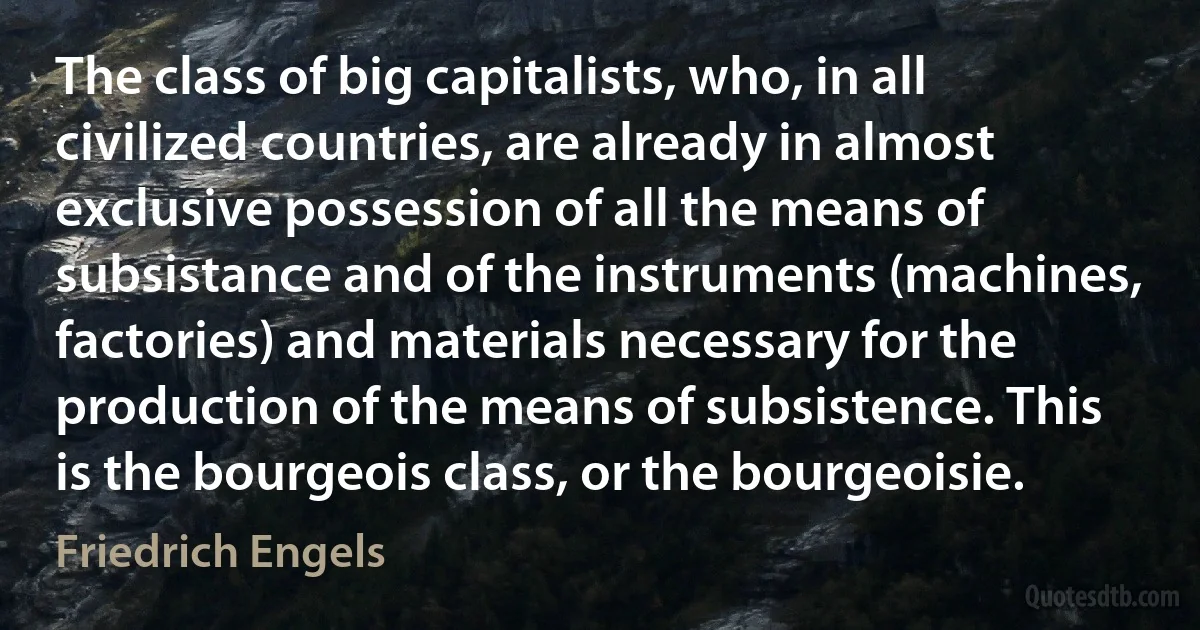Class Quotes - page 40
The American people are right in demanding that New Nationalism, without which we cannot hope to deal with new problems. The New Nationalism puts the national need before sectional or personal advantage. It is impatient of the utter confusion that results from local legislatures attempting to treat national issues as local issues. It is still more impatient of the impotence which springs from over division of governmental powers, the impotence which makes it possible for local selfishness or for legal cunning, hired by wealthy special interests, to bring national activities to a deadlock. This New Nationalism regards the executive power as the steward of the public welfare. It demands of the judiciary that it shall be interested primarily in human welfare rather than in property, just as it demands that the representative body shall represent all the people rather than any one class or section of the people.

Theodore Roosevelt
The line of cleavage drawn on principle and conduct in public affairs is never in any healthy community identical with the line of cleavage between creed and creed or between class and class. On the contrary, where the community life is healthy, these lines of cleavage almost always run nearly at right angles to one another. It is eminently necessary to all of us that we should have able and honest public officials in the nation, in the city, in the state. If we make a serious and resolute effort to get such officials of the right kind, men who shall not only be honest but shall be able and shall take the right view of public questions, we will find as a matter of fact that the men we thus choose will be drawn from the professors of every creed and from among men who do not adhere to any creed.

Theodore Roosevelt
Probability theory is an ideal tool for formalizing uncertainty in situations where class frequencies are known or where evidence is based on outcomes of a sufficiently long series of independent random experiments. Possibility theory, on the other hand, is ideal for formalizing incomplete information expressed in terms of fuzzy propositions.

George Klir
Applying this approach, systems belonging to different scientific disciplines are investigated in their natural forms. On the basis of experimental results, isomorphic relations between different systems are studied and, finally, some general principles applicable for all systems of a certain class are formulated.

George Klir
By default, we have created a "system" of nursing-home care for the aged in which middle-class people pay exorbitant rates to for-profit nursing-home entrepreneurs - and then when private resources are consumed and the patient qualifies as a pauper, the nursing home begins billing Medicaid. This is precisely the antithesis of social citizenship; instead of the poor being accorded the dignity associated with the middle class, equality of treatment is achieved by making the middle class undergo pauperization.

Robert Kuttner
Labor is a commodity, like any other, and its price is therefore determined by exactly the same laws that apply to other commodities. In a regime of big industry or of free competition – as we shall see, the two come to the same thing – the price of a commodity is, on the average, always equal to its cost of production. Hence, the price of labor is also equal to the cost of production of labor. But, the costs of production of labor consist of precisely the quantity of means of subsistence necessary to enable the worker to continue working, and to prevent the working class from dying out. The worker will therefore get no more for his labor than is necessary for this purpose; the price of labor, or the wage, will, in other words, be the lowest, the minimum, required for the maintenance of life.

Friedrich Engels
The proletariat is that class in society which lives entirely from the sale of its labor and does not draw profit from any kind of capital; whose weal and woe, whose life and death, whose sole existence depends on the demand for labor – hence, on the changing state of business, on the vagaries of unbridled competition.

Friedrich Engels
Big industry has brought all the people of the Earth into contact with each other, has merged all local markets into one world market, has spread civilization and progress everywhere and has thus ensured that whatever happens in civilized countries will have repercussions in all other countries. It follows that if the workers in England or France now liberate themselves, this must set off revolution in all other countries – revolutions which, sooner or later, must accomplish the liberation of their respective working class.

Friedrich Engels
The slave is sold once and for all; the proletarian must sell himself daily and hourly. The individual slave, property of one master, is assured an existence, however miserable it may be, because of the master's interest. The individual proletarian, property as it were of the entire bourgeois class which buys his labor only when someone has need of it, has no secure existence. This existence is assured only to the class as a whole.

Friedrich Engels
Democratic socialists are either proletarians who are not yet sufficiently clear about the conditions of the liberation of their class, or they are representatives of the petty bourgeoisie, a class which, prior to the achievement of democracy and the socialist measures to which it gives rise, has many interests in common with the proletariat. It follows that, in moments of action, the communists will have to come to an understanding with these democratic socialists, and in general to follow as far as possible a common policy with them – provided that these socialists do not enter into the service of the ruling bourgeoisie and attack the communists. It is clear that this form of co-operation in action does not exclude the discussion of differences.

Friedrich Engels
The introduction of free competition is thus public declaration that from now on the members of society are unequal only to the extent that their capitals are unequal, that capital is the decisive power, and that therefore the capitalists, the bourgeoisie, have become the first class in society. Free competition is necessary for the establishment of big industry, because it is the only condition of society in which big industry can make its way.

Friedrich Engels
What will be the attitude of communism to existing nationalities? The nationalities of the peoples associating themselves in accordance with the principle of [[community will be compelled to mingle with each other as a result of this association and thereby to dissolve themselves, just as the various estate and class distinctions must disappear through the abolition of their basis, private property.

Friedrich Engels
Education will enable young people quickly to familiarize themselves with the whole system of production and to pass from one branch of production to another in response to the needs of society or their own inclinations. It will, therefore, free them from the one-sided character which the present-day division of labor impresses upon every individual. Communist society will, in this way, make it possible for its members to put their comprehensively developed faculties to full use. But, when this happens, classes will necessarily disappear. It follows that society organized on a communist basis is incompatible with the existence of classes on the one hand, and that the very building of such a society provides the means of abolishing class differences on the other.

Friedrich Engels
Wherever big industries displaced manufacture, the bourgeoisie developed in wealth and power to the utmost and made itself the first class of the country. The result was that wherever this happened, the bourgeoisie took political power into its own hands and displaced the hitherto ruling classes, the aristocracy, the guildmasters, and their representative, the absolute monarchy. The bourgeoisie annihilated the power of the aristocracy, the nobility, by abolishing the entailment of estates – in other words, by making landed property subject to purchase and sale, and by doing away with the special privileges of the nobility. It destroyed the power of the guildmasters by abolishing guilds and handicraft privileges. In their place, it put competition – that is, a state of society in which everyone has the right to enter into any branch of industry, the only obstacle being a lack of the necessary capital.

Friedrich Engels
I have never seen a class so deeply demoralised, so incurably debased by selfishness, so corroded within, so incapable of progress, as the English bourgeoisie; and I mean by this, especially the bourgeoisie proper, particularly the Liberal, Corn Law repealing bourgeoisie. For it nothing exists in this world, except for the sake of money, itself not excluded. It knows no bliss save that of rapid gain, no pain save that of losing gold. In the presence of this avarice and lust of gain, it is not possible for a single human sentiment or opinion to remain untainted.

Friedrich Engels
I forsook the company and the dinner-parties, the port-wine and champagne of the middle-classes, and devoted my leisure-hours almost exclusively to the intercourse with plain working men; I am both glad and proud of having done so. Glad, because thus I was induced to spend many a happy hour in obtaining a knowledge of the realities of life-many an hour, which else would have been wasted in fashionable talk and tiresome etiquette; proud, because thus I got an opportunity of doing justice to an oppressed and calumniated class of men who with all their faults and under all the disadvantages of their situation, yet command the respect of every one but an English money-monger.

Friedrich Engels
The only difference as compared with the old, outspoken slavery is this, that the worker of today seems to be free because he is not sold once for all, but piecemeal by the day, the week, the year, and because no one owner sells him to another, but he is forced to sell himself in this way instead, being the slave of no particular person, but of the whole property-holding class.

Friedrich Engels



